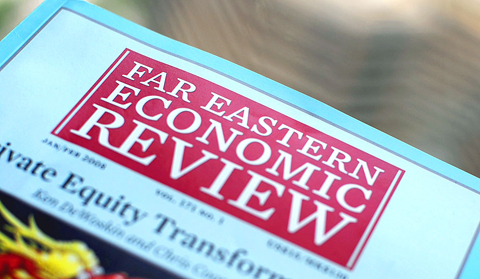The Far Eastern Economic Review (FEER), one of Asia’s leading print publications, will be shut down by News Corp as it struggles with losses and a dwindling readership migrating to the Internet.
The 63-year-old magazine, which was run by News Corp’s Dow Jones and enjoyed a weighty reputation for its fearless and in-depth Asian business and political coverage since World War II, will close in December, Dow Jones said.
The announcement marks the denouement of what observers and former staffers said had been a gradual decline in the fortunes of one of the great titles in Asian journalism, once considered essential reading for the region’s intelligentsia.

PHOTO: AFP
“The decision to cease publication of the Review is a difficult one made after a careful study of the magazine’s prospects in a challenging business climate,” said Todd Larsen, chief operating officer at Dow Jones Consumer Media Group.
In 2004, Dow Jones fired most of FEER’s reporters and transformed it into a monthly publication. Articles were largely commissioned and only a skeleton editorial staff was retained.
David Plott, FEER’s editor at the time, described the upheaval in 2004 as a loss of one of the “greatest concentrations of knowledge and expertise about the region assembled anywhere.”
The magazine’s demise comes as publishers gravitate toward electronic media and advertising revenues dwindle. In 2001, Asiaweek, another respected Asian weekly magazine, folded after 26 years.
“It’s paradoxical that as the region becomes more and more important, there are fewer and fewer publications producing quality coverage,” said Hugo Restall, FEER’s current editor.
Restall will remain on the editorial board of the Wall Street Journal, also run by Dow Jones.
A string of notable figures and correspondents have worked for FEER, including John King Fairbank, the Harvard sinologist, and the writer Ian Buruma.
Throughout its history, FEER’s investigative and critical journalism has sparked tussles with Asian governments. The magazine is currently embroiled in a legal battle with the Singapore government, with the island-state’s High Court ruling it defamed elder statesman Lee Kuan Yew (李光耀) and his son, Prime Minister Lee Hsien Loong (李顯龍).
FEER subsequently appealed the verdict.
“If we lose that then there’s a question of whether they want to try to enforce the judgment in Hong Kong. Conceivably it could continue,” Restall said.
Another FEER editor, Philip Bowring, also grappled with a lawsuit by the Singaporean government before he left the Review in 1992.

In the sweltering streets of Jakarta, buskers carry towering, hollow puppets and pass around a bucket for donations. Now, they fear becoming outlaws. City authorities said they would crack down on use of the sacred ondel-ondel puppets, which can stand as tall as a truck, and they are drafting legislation to remove what they view as a street nuisance. Performances featuring the puppets — originally used by Jakarta’s Betawi people to ward off evil spirits — would be allowed only at set events. The ban could leave many ondel-ondel buskers in Jakarta jobless. “I am confused and anxious. I fear getting raided or even

Kemal Ozdemir looked up at the bare peaks of Mount Cilo in Turkey’s Kurdish majority southeast. “There were glaciers 10 years ago,” he recalled under a cloudless sky. A mountain guide for 15 years, Ozdemir then turned toward the torrent carrying dozens of blocks of ice below a slope covered with grass and rocks — a sign of glacier loss being exacerbated by global warming. “You can see that there are quite a few pieces of glacier in the water right now ... the reason why the waterfalls flow lushly actually shows us how fast the ice is melting,” he said.

Eleven people, including a former minister, were arrested in Serbia on Friday over a train station disaster in which 16 people died. The concrete canopy of the newly renovated station in the northern city of Novi Sad collapsed on Nov. 1, 2024 in a disaster widely blamed on corruption and poor oversight. It sparked a wave of student-led protests and led to the resignation of then-Serbian prime minister Milos Vucevic and the fall of his government. The public prosecutor’s office in Novi Sad opened an investigation into the accident and deaths. In February, the public prosecutor’s office for organized crime opened another probe into

RISING RACISM: A Japanese group called on China to assure safety in the country, while the Chinese embassy in Tokyo urged action against a ‘surge in xenophobia’ A Japanese woman living in China was attacked and injured by a man in a subway station in Suzhou, China, Japanese media said, hours after two Chinese men were seriously injured in violence in Tokyo. The attacks on Thursday raised concern about xenophobic sentiment in China and Japan that have been blamed for assaults in both countries. It was the third attack involving Japanese living in China since last year. In the two previous cases in China, Chinese authorities have insisted they were isolated incidents. Japanese broadcaster NHK did not identify the woman injured in Suzhou by name, but, citing the Japanese